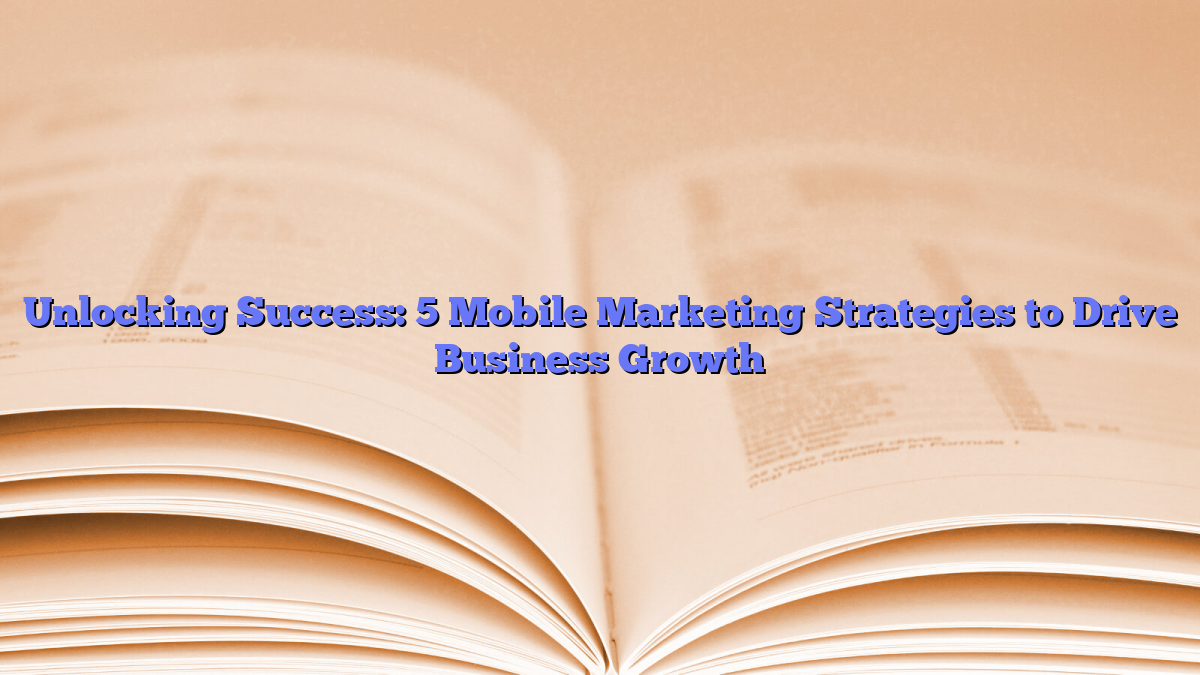[ad_1]
In today’s digital age, mobile marketing has become a crucial aspect of any successful business strategy. With the increasing use of smartphones and mobile devices, businesses have the opportunity to reach their target audience in new and innovative ways. In this article, we will explore five mobile marketing strategies that can help drive business growth and unlock success.
1. Mobile-Friendly Website
The first step in any successful mobile marketing strategy is to ensure that your website is mobile-friendly. With more and more people accessing the internet on their smartphones, it’s essential that your website is easy to navigate and visually appealing on mobile devices. A mobile-friendly website will not only improve the user experience but also boost your search engine rankings, as Google prioritizes mobile-friendly websites in its search results.
2. Mobile Advertising
Mobile advertising is a powerful tool for reaching your target audience on their smartphones and mobile devices. With a variety of advertising options, such as social media ads, mobile display ads, and in-app ads, businesses can effectively target and engage with their audience in a way that traditional advertising methods cannot. By leveraging mobile advertising, businesses can increase brand awareness, drive website traffic, and ultimately drive business growth.
3. SMS Marketing
SMS marketing is a highly effective mobile marketing strategy that allows businesses to reach their customers directly on their mobile devices. By sending personalized and targeted text messages, businesses can engage with their customers in a more personal and direct way, leading to higher open and conversion rates. SMS marketing can be used to promote sales, send out special offers, and even provide customer support, making it an invaluable tool for driving business growth.
4. Mobile Apps
Mobile apps have become an integral part of the mobile experience, and businesses can leverage this trend to drive business growth. By developing a mobile app for your business, you can provide your customers with a convenient and personalized way to interact with your brand. From making purchases to accessing exclusive content, a mobile app can help increase customer loyalty and drive sales, ultimately leading to business growth.
5. Location-Based Marketing
Location-based marketing is a mobile marketing strategy that utilizes a customer’s location to deliver targeted marketing messages and promotions. By leveraging geotargeting and beacon technology, businesses can send personalized offers and messages to customers when they are in close proximity to their physical location. This can help drive foot traffic to brick-and-mortar stores, increase sales, and improve overall customer engagement.
Conclusion
Mobile marketing has become an essential component of any successful business strategy. By implementing the five mobile marketing strategies outlined in this article, businesses can effectively reach their target audience on mobile devices, increase brand awareness, drive website traffic, and ultimately drive business growth. From optimizing your website for mobile devices to leveraging location-based marketing, businesses can unlock success and stay ahead of the competition in today’s mobile-first world.
FAQs
Q: How can I make my website mobile-friendly?
A: To make your website mobile-friendly, you can use responsive design, which allows your website to adapt to different screen sizes and devices. You can also test your website’s mobile-friendliness using Google’s Mobile-Friendly Test tool.
Q: What are some best practices for SMS marketing?
A: Some best practices for SMS marketing include obtaining consent from customers before sending them text messages, providing value in your messages, and personalizing your messaging to each recipient.
Q: How can I leverage location-based marketing for my business?
A: To leverage location-based marketing, you can use geotargeting and beacon technology to target customers in close proximity to your physical location. You can also offer special promotions and messages to customers based on their location.
[ad_2]

